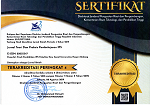Pengembangan media Janus (Jelajah Nusantara) pada mata pelajaran IPS
Abstract
This study aims to determine the process and results of the development of the Nusantara Exploration learning media on social studies subjects and to know the effectiveness of the Nusantara Exploration learning media on social studies subjects. This development research uses the development model of Dick, Carey, and Carey. Product development is tested through formative evaluation, which includes several stages: expert review of social study materials, design expert review and learning media, individual trials, small group trials, and field trials. Due diligence by the expert team obtained 97.17% results from media experts and 94.83% from material experts. After being revised based on responses from the expert team, individual trials were carried out at 85.05%, small group trials at 90.17%, and field trials at 90.47. T-test results show that in field trials, it is proven that this product is effective in improving student learning outcomes. Overall evaluation results, placing this development product in the category, is very feasible.
Keywords
Full Text:
PDFReferences
Anitah, S. 2010. Media Pembelajaran. Surakarta: UNS Press.
Dick, W., Carey, J., dan Carey, L. 2009. The Systematic Desaign Of Instruction Fourth Edition. New Jersey: Pearson Education Inc.
Kickmeier-Rust and Albert.( 2012). A domain model for smart 21st century skills training in game-based virtual worlds. in IEEE 12th International Conference on Advanced Learning Technologies, Rome, Italy, 2012, pp. 670–680. https://doi.org/10.1109/icalt.
Perrota, Carlo. (2013). Game Based Learning: Latest Evidence and Future Directions. National Foundation for Educational Research, UK, Research report
Project Tomorrow. (2008). 21St Century Learners Deserve a 21St Century Education.
Ratnawati, N. et al. (2020) ‘“Defense of the Ancients”, Gamification in Learning: Improvement of Student’s Social Skills’, l of Emerging Technologies in Learning (iJET), 15(7). Available at: https://onlinejour.journals.publicknowledgeproject.org/index.php/i-jet/article/view/13221 (Accessed: 30 April 2020).
Redecker, M. Leis, M. Leendertse, Y. Punie, G. Gijsbers, and P. Kirschner.(2011). The future of learning: Preparing for change. Franch: Publications office of the European Union Sourmelis, Ioannou, and Zaphiris. (2017). Massively multiplayer online role-playing games (MMORPGs) and the 21st century skills: A comprehensive research review from 2010 to 2016. Comput. Hum. Behav., vol. 67, pp. 41–48, 2017. https://doi.org/10.1016/j.chb.2016.10.020
Supardan, D. 2015. Pembelajaran Ilmu Pengetahuan Sosial Perspektif Filosofi dan Kurikulum. Jakarta: PT Bumi Aksara.
Suparno, P. 2014. Filsafat Konstruktivisme dalam Pendidikan. Yogjakarta: Kanisius.
Haqiqi, N dan Suprayitno, 2017. Penggunaan Media Monopoli Untuk Meningkatkan Hasil Belajar Siswa Pada Materi Keragaman Ekonomi di Indonesia Dalam Tema Indahnya Keragaman Di Negeriku Di Kelas IV SDN Babatan I/456 Surabaya. Jurnal PGSD 05(03), pp. 1335-1344.
Refbacks
- There are currently no refbacks.
Editorial and Administration Office:
This Journal is published by Prodi Pendidikan IPS, Fakultas Ilmu Sosial, Universitas Negeri Malang
Semarang St. No. 5 Building I3-102 65145.
Phone. (0341) 551312. line. 376 (19)
Homepage: http://journal2.um.ac.id/index.php/jtppips/index
email: jtp2ips.journal@um.ac.id
JTP2IPS INDEXED BY:
e-ISSN 2503-5347
ISSN 2503-1201
JTP2IPS is licensed by CC BY 4.0.










